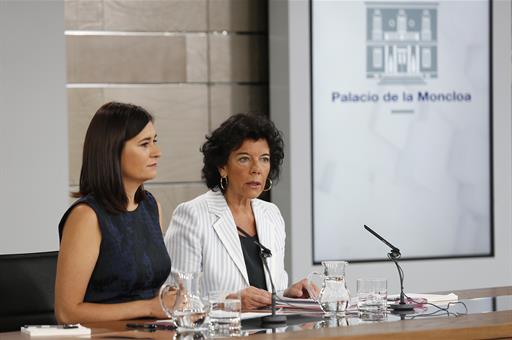Council of Ministers
Government presents new measures to defend children's rights
Council of Ministers - 2018.9.7
Moncloa Palace, Madrid
The Council of Ministers analysed a report on the Draft Bill on the Comprehensive Protection of Children from Violence, which is "a priority area of protection" for the government, explained the Minister for Health, Consumption and Social Well-being, Carmen Montón.
The minister stressed that the goal of the future legislation is "to respect the dignity, liberty and equality of children and guarantee the free development of their personality in an environment that does not include violence". The new law will be comprehensive in nature and will pay special attention to the areas of prevention, socialisation and education of children, and seeks to raise awareness of families and society.
Carmen Montón specified that the text "will include sexual abuse and new forms of violence, such as harassment and violence exercised through the social media".
The new legislation will develop specific measures for those groups of children in special situations of vulnerability, such as girls who have been victims of people trafficking, minors with some form of disability, unaccompanied foreign minors and those living in an environment of sexual diversity: lesbians, gays, bisexuals and transsexuals, remarked the minister.
The document will provide for a unified register on child victims, which will allow for all the information on violence exercised against children and adolescents to be contained in a single file. It will also update matters relating to the special disqualification from the exercise of certain professions, voluntary work and activities that involve contact with children, with particular reference to circumstances on the deprivation of parental rights, guardianship, foster care, family placements and adoption, always looking to the overriding interest of the minor.
"The aim is for public authorities, organisations and citizens as a whole to act in a more effective and forceful manner. Each and every one of us has a role to play in ensuring that all boys and girls enjoy a fully and happy childhood", said the minister.
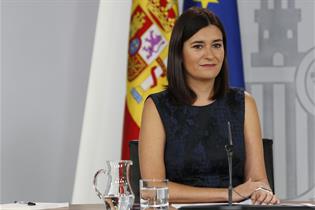 Pool Moncloa/ César P. PorrasCarmen Montón announced that work will be done on the training and specialisation of judges, prosecutors and other professionals. Furthermore, children's rights in criminal and civil processes will be guaranteed, particularly their right to be heard. Prevention will also be included in such areas as the family, education, social welfare, sports, leisure and digital activities.
Pool Moncloa/ César P. PorrasCarmen Montón announced that work will be done on the training and specialisation of judges, prosecutors and other professionals. Furthermore, children's rights in criminal and civil processes will be guaranteed, particularly their right to be heard. Prevention will also be included in such areas as the family, education, social welfare, sports, leisure and digital activities.
The government, pointed out Carmen Montón, wishes to offer effective protection through measures to detect and assist, but also "to reinstate rights that have been violated and recovery for victims". "The aim is to raise awareness regarding violence against children and thus make the detection of situations easier and provide a better response", she added
Debate and participation
The minister reported that the procedure to develop this legislation began with a public consultation process on the web page of the Ministry of Health, Consumption and Social Well-being, which will finalise on 17 September.
Carmen Montón stressed that a participation and dialogue process has commenced to draft the future legislation, which is gathering together contributions from social and scientific organisations and other child related bodies.
Furthermore, several ministerial departments are involved, together with the Juvenile Prosecution Service, local and regional authorities, and the children affected. This dialogue process will continue on Wednesday, 12 September at the plenary session of the Children's Watchdog.
Unaccompanied minors
The Minister for Health, Consumption and Social Well-being stressed that another of the priorities the government is working on is protection for unaccompanied minors. In this regard, she recalled that her department presented the regional governments on 5 September with a proposal to improve support for these children and adolescents.
This measure will have a budget of 40 million euros, in addition to the more than 6 million euros already approved for the autonomous cities of Ceuta and Melilla.
Fight against child poverty
The fight against child poverty, remarked Carmen Montón, is also a priority, and hence one of the first measures adopted by the government was to double the budget allocated to the VECA Programme [Continue Learning in School Holidays], which seeks to cover the basic needs of food and educational recreation during the summer.
The financial provision of this programme, shared among the different regions and autonomous cities, amounts to more than 10 million euros.
Emergency aid
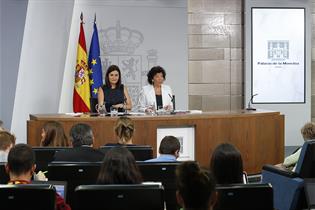 Pool Moncloa/ César P. PorrasThe Council of Ministers approved the declaration of the Region of Valencia and the municipality of Tui (Pontevedra) as "areas seriously affected by a civil protection emergency".
Pool Moncloa/ César P. PorrasThe Council of Ministers approved the declaration of the Region of Valencia and the municipality of Tui (Pontevedra) as "areas seriously affected by a civil protection emergency".
The grounds for this are, respectively, the serious fires in August in Valencia and the explosion in a fireworks warehouse in the parish of Paramos on 23 May.
The Minister for Education and Vocational Training, and Government Spokesperson, Isabel Celaá, explained that the declaration guarantees access to a series of special financial aids and tax exemptions, "even including the possibility of exempting individuals seriously affected from paying personal income tax".
Ecological transition
The government allocated 1.5 million euros to the direct grant of a subsidy to implement refrigeration plants based on alternative technologies to fluoride gases with a high global warming potential. These subsidies will go to establishments engaged in the commercial distribution of food.
Isabel Celaá framed this initiative as part of the ecological transition and the fight against climate change.
Highway maintenance
The Council of Ministers authorised maintenance and operation contracts on State highways in several sectors in the provinces of Madrid, Valladolid, Salamanca, Valencia and Toledo for a total sum of 153 million euros (excluding VAT).
Together with the contracts authorised by the Council of Ministers last Friday, the total amount of investment in highways is close to 300 million euros.
Transposition of directives
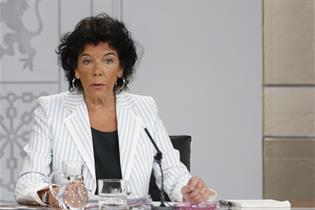 Pool Moncloa/ César P. PorrasThe Council of Ministers transposed two European directives on Friday: the first relating to network and IT system security, which seeks to attain a high common security level throughout the European Union.
Pool Moncloa/ César P. PorrasThe Council of Ministers transposed two European directives on Friday: the first relating to network and IT system security, which seeks to attain a high common security level throughout the European Union.
Secondly, the directive that guarantees equality and non-discrimination in user access to web sites and mobile phone apps in the public sector, particularly by persons with disabilities and elderly people with visual or hearing difficulties.
Isabel Celaá explained that Spain still has to transpose 25 European directives into its domestic legislation, "and hence we will have to move swiftly to avoid being fined".
Time change
The Council of Ministers set up a committee of experts to study a change in the official time and its effects on health, quality of life, the economy and energy savings.
The Minister for Education and Vocational Training stressed that the government wants to address this matter "seriously". Each Member State of the European Union will have to approve a reform to carry this out, she added, but the government "is preparing its own opinion" so as to take part in this process.
Other agreements adopted by Council of Ministers
- Capital subscription of the European Investment Bank for a maximum additional sum of 4.52 billion euros in the event of the withdrawal of the United Kingdom from the EU.
- Allocation of more than 25 million euros to evaluate and protection the marine environment.
- Authorisation to contract a specialised helicopter service to fight wildfires.
- Approval of report on functioning of the services of the State Peripheral Administration in 2017.
Renewal and dialogue
At the start of her speech, Isabel Celaá took stock of the first three months of government which, in her opinion, "has activated Spanish politics", and initiated a "renewal phase" in democracy and social and European policies. The government also set up dialogue with all sectors and pushed through some 50 measures of varying magnitudes, including 15 legislative reforms, she pointed out.
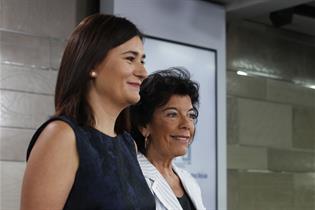 Pool Moncloa/ César P. PorrasThe Government Spokesperson asserted that the government "wants to ring-fence the Welfare State, with an ongoing commitment to social policies such as healthcare and education". Among the main goals of the government, she mentioned the reforms for energy transition, the fight against discrimination and xenophobia, work on the historical memory, boosting the common European project and relations with Latin America. "A government, in short, that is committed to tackling conflicts through dialogue and negotiations within the framework of the law", she said.
Pool Moncloa/ César P. PorrasThe Government Spokesperson asserted that the government "wants to ring-fence the Welfare State, with an ongoing commitment to social policies such as healthcare and education". Among the main goals of the government, she mentioned the reforms for energy transition, the fight against discrimination and xenophobia, work on the historical memory, boosting the common European project and relations with Latin America. "A government, in short, that is committed to tackling conflicts through dialogue and negotiations within the framework of the law", she said.
As Minister for Education and Vocational Training, Isabel Celaá highlighted the approval of the Royal Decree on grants and study aid and announced that this month the procedure will be initiated on the draft law to repeal the Royal Decree on cost reductions in education. Her ministerial department will also work on the financing of the first stage of nursery education (0-3 years of age) and on textbooks and educational material, she announced.
Non official translation





